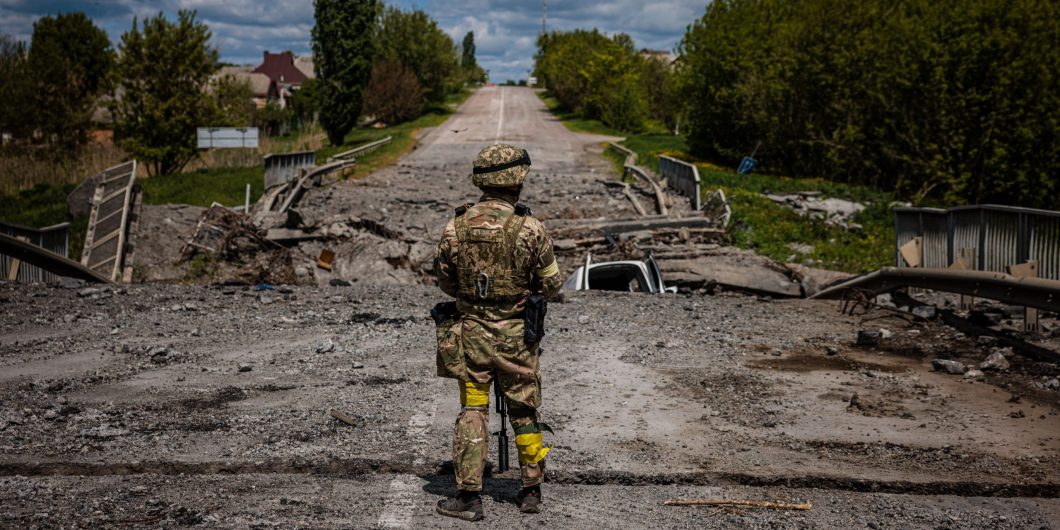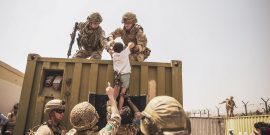Communicating a lack of commitment to NATO will harm allies who have done everything we’ve asked.
East of Kharkiv
Chuckling. Three Americans, a Canadian, and a New Zealander, jammed into a camouflaged Volkswagen minibus bristling with silenced AKs, and foam-flanged anti-tank weapons—laughing it up with a former Soviet Spetznaz sergeant major who goes by “Brian.” It’s like one of those elaborate jokes you mess up before the punchline.
“Who would have thought,” we tease Brian (likewise a veteran of Afghanistan but, erm, decades earlier . . .) “you’d be hellbent on killing Russians along with a bus full of gringos?” He takes it in stride—he sought asylum in the States years ago and is an American citizen, though his ancestral roots are in Ukraine. He grins. It all seems so natural and normal; sometimes it’s worth reminding yourself how insane it all is.
Closer to the line. Farm fields, which despite news to the contrary are being actively worked, are pockmarked with fresh artillery craters. As we approach the burning front, more and more craters appear—more and more of them in the road. “Watch for ze potholes” says Black, a clean-cut Ukrainian officer. Not because he’s worried about the high explosives we carry, but because they are a “guud place for to put mines.” Seems like a good call.
Our chain-smoking driver, a sniper-in-training we call “Annie,” doesn’t give a shit. “Zey shoot us here yesterday zo I drive zo fast.” Bracing against the dash, trying to stay clear of her immensely confident shift pattern, while she steers with her cigarette hand. She gets a call—nobody knows how, since there’s almost no cell signal. “Good thing she can’t answer it,” I think, “seeing’s as her hands are full.”
But she can and she does.
“Da, da. . . . Da!”
Can’t follow the rest. Something about her kids. She hangs up, exasperated, giving the van a mean little grind.
We come to a forward observation group. Six guys lounging in the shade. The oldest guy looks like a farmer, weather-beaten with uniform drooping open in front, using a multi-tool to cut cable for some project. Yes, they say, the road was shot from the left side three minutes ago. Or maybe five.
Black, sharp-eyed, asks if we want to go on. Mike, a quiet, hulking former Ranger sniper is, not surprisingly, pretty okay with it. We ask Spetznaz Brian to ask Annie, who is off messing with some damn thing or other on the van.
“Da,” she says, sniffing and wiping hair out of her eyes.
Wouldn’t miss it for the world, I gather.
We bounce along even faster. Fresh cluster munitions canisters stick three feet out of the ground, glinting like oversized aluminum lawn darts. Probably what started all the fires. There’s one in the road ahead, and Annie, to her credit, goes around it.
We park the van under brush while smoke wafts through the trees. We’re crammed so tight Black can’t open the door—Canada has to let him out, chortling. We offload, cycle actions and safeties off. Staying within the burnt treeline, we fan out with heads on a swivel and arrive at a recently abandoned Ukrainian forward position. A hard-boiled egg sits neatly on a table under a shredded plastic awning.
We go forward until Mike signals “voices.”
It’s pretty here. The parts that aren’t burned look like a Thomas Cole landscape—the smoke lending a certain ambience.
Canada digs out his drones. Black asks if I’ll take left perimeter guard——watching for Russian special forces that have been crossing the Donets. Um, sure . . .
Oddly tranquil. The artillery fire (from both sides) is actually going over us—you can hear it whisper sometimes—but the rumble is distant enough the birds still sing.
Kharkiv at sunset: cruise missile attack and a towering plume of black smoke. Same old story. Packing up gear in the back of the careening van, I glance at my watch. There’s just no way Annie can pull this off.
The drone is up and doing its thing. A handful of curious hawks come gliding along to investigate, twisting their heads to consider this earnest little intruder. Swapping perimeter guard, I take a peek at the drone screen. Canada flies the camera three-hundred meters ahead of us, peering down on an occupied village. He and Black compare notes—moving from intersection to intersection to see what can be seen.
“Look.” Two Russian soldiers, standing at a partially constructed checkpoint, while the Russian flag flutters on an occupied factory behind them.
“Check onder det roof” says Black, “Dey like to hide stuff under der.” A twist and the drone can see obliquely under the portico. Nothing. A front-loader and forklift are finishing up the fortified entry. A farmer is out in the field behind the Russians, spring planting.
Slapping mosquitoes, we continue to surveil. A black van, emblazoned with the unmistakable “Z” speeds up the road and out of sight. Signal is iffy, and the drone almost slips away. We debate whether the Russians here are capable of jamming, and then suddenly, miraculously, the drone regains signal and comes home.
Batteries drained, we head back to bivouac. Black and I, squeezed again into the front seat, accidentally discover Spanish to be a common path around the language barrier. He spent three years in Spain—something to do with rental cars?—and Spain is where he wanted his wife and kids to go before they chose Germany instead. We muse aloud on the Teutons and Iberians, laughing over familiar stereotypes.
Back at post, Annie beelines for the fishing pond, loathe to return to Kharkiv. The rest of the guys gather on the screened porch out of the mosquitos, bantering and teasing like young soldiers everywhere. Mike and I sit quietly on the periphery, catching up on email through a lightning-fast Starlink connection. A freshly killed boar soaks in salt water, and they all ask again if we’re sure we don’t want to stay?
No help for it, gotta run—train to catch. A flurry of cheerful farewells, some helpful tips about a blown-out bridge, and Brian, Annie, and I are on the road again. Grinding our way through the dark, (“stay to the right they said?”), we stop at a roadside farm stand to buy fresh mint and potatoes. There’s no way we’re gonna make it in time.
But Annie’s back on the job, weaving through potholes and up rutted back roads like a boss. We crack open a can of jellied meat (chicken I think?). Nothing but a combat knife to eat with, so I cut slabs and we munch away. Not bad. Brian tells me an old Ukrainian saying that “eating from the same knife” is a sign of trust.
“You are my braader now, Poul.”
Kharkiv at sunset: cruise missile attack and a towering plume of black smoke. Same old story. Packing up gear in the back of the careening van, I glance at my watch. There’s just no way Annie can pull this off.
But she can and she does. We screech into the train station in a cloud of clutch fumes, and she and Brian help me to the right platform for the night train to Kyiv. Trundled into a carriage with exactly one minute to spare, amidst a flurry of hugs and handshakes.
As the train rolls out, I open the shade to wave. An attendant barks at me that it invites attacks but I roll my eyes, watching Brian and Annie wave back. There’s a tear in Annie’s eye. She’d deny it, but I saw it—blurred.



